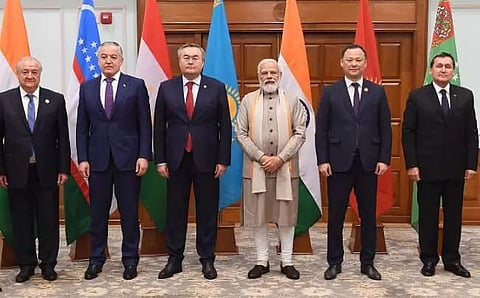
- Home
- Live Blog
- Breaking News
- Top Headlines
- Cities
- NE News
- Sentinel Media
- Sports
- Education
- Jobs

NEW DELHI: The Foreign Ministers of five central Asian countries met Prime Minister Narendra Modi on Monday and emphasised the readiness of their leadership to further strengthen relations with India. Foreign Ministers of Kazakhstan, Kyrgyz Republic, Tajikistan, Turkmenistan and Uzbekistan met the Prime Minister in Delhi.
They are on a visit to participate in the third meeting of the India-Central Asia Dialogue. The Central Asian Foreign Ministers conveyed the greetings of their Presidents to Prime Minister Modi and emphasised the readiness of their leadership to further strengthen relations with India.
They briefed the Prime Minister on the deliberations of the India-Central Asia Dialogue held under the chairmanship of External Affairs Minister of India on December 18-19, which focused on trade and connectivity, development partnership and regional developments, including the situation in Afghanistan.
The Prime Minister emphasised the importance that India attaches to its long-standing relations with Central Asian countries, which are part of its 'Extended Neighbourhood'.
He conveyed his felicitations to the Ministers on the 30th anniversary of their independence this year. He recalled his memorable visits to all Central Asian countries in 2015 and subsequently to Kazakhstan, Uzbekistan and Kyrgyz Republic.
The Prime Minister underlined the importance of maintaining cultural and people-to-people contacts between India and Central Asia, given the popularity of Indian films, music, yoga etc in the region. He also underscored the potential of enhanced economic cooperation between India and Central Asia, and the role of connectivity in that regard.
The India-Central Asia Dialogue has given impetus to the excellent bilateral relations between India and Central Asian countries. India and the Central Asian countries will mark the 30th anniversary of the establishment of their diplomatic relations next year.
After the dialogue on Sunday, in a joint statement, six countries reiterated strong support for a peaceful, secure and stable Afghanistan while emphasising the respect for sovereignty, unity and territorial integrity and non-interference in its internal affairs.
They had also discussed the current humanitarian situation and decided to continue to provide immediate humanitarian assistance to the Afghan people.
They had reaffirmed the importance of UNSC Resolution 2593 (2021) which unequivocally demands that Afghan territory not be used for sheltering, training, planning or financing terrorist acts and called for concerted action against all terrorist groups.
The Ministers also agreed to continue close consultations on the situation in Afghanistan.
"While taking note of the outcome document of the Delhi Regional Security Dialogue of November 10, 2021, Ministers noted that there is a broad regional consensus' on the issues related to Afghanistan, which includes formation of a truly representative and inclusive government, combating terrorism and drug trafficking, central role of the UN, providing immediate humanitarian assistance for the Afghan people and preserving the rights of women, children and other national ethnic groups," said the joint statement.
The Ministers stressed that perpetrators, organisers, financiers and sponsors of terrorist acts must be held accountable and brought to justice in accordance with principle of "extradite or prosecute." In this context, they called for early adoption of the UN Comprehensive Convention on International Terrorism.
"They called on the international community to strengthen UN-led global counter-terrorism cooperation and fully implement the relevant UNSC resolutions, Global Counter-Terrorism Strategy and FATF standards, added the statement. (IANS)
Also Watch: